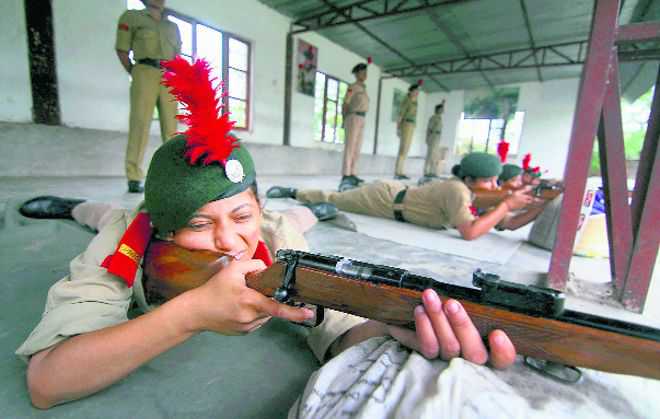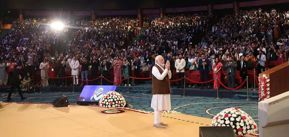
TOUGH JOB: Let alone women, even many men find it difficult to cope with the rigours that a combat soldier has to face.
Lt Gen SR Ghosh (retd)
Former GOC-in-C, Western Command
OVER 12 years after the then Vice Chief of the Army fired the first salvo, the present Army Chief carried out ‘carpet-bombing’ last month when he spoke his mind on the problems of inducting women into combat. In 2006, the Vice Chief had remarked that the comfort levels with women officers in the Army were low and that we could do without them. Right or wrong, he was pressured into making a public apology. Gen Bipin Rawat, in a recent interview to a news channel, reopened the debate when he stated that women in combat areas would have to be kept cocooned from prying eyes and that the Army could not have Commanding Officers of operational units getting pregnant and proceeding on long maternity leave.
The Army Chief’s views may not have been couched in diplomatese, but there definitely was merit in what he implied. Unfortunately, this has reignited an avoidable debate with indignant protests from women’s rights activists, IPS officers and even some military veterans. The arguments given by most of these people are based on superficial knowledge or experience of our combat arms and of warfare. Their reactions are based more on social issues of equal rights and feminism rather than on pragmatism, ranging from an absurd comparison with Jhansi ki Rani who “could even fight with her adopted son strapped to her back”, to the modern era where women succeeded in becoming airline pilots, Everest summiteers and champions in boxing and wrestling. One veteran commentator even suggested that the Army should induct women into combat roles quickly before the judiciary forced it to do so.
At the outset, it must be clarified that the capability of women in any field, be it politics, banking, civil services, business or sports, to name a few, has never been doubted. In the military, women doctors and nurses have served with distinction since time immemorial. Since 1992, women have also been commissioned into other branches of the Armed Forces, even though issues of their management and logistics keep cropping up from time to time. In 2015, the Indian Air Force inducted the first women as fighter pilots, while the Navy will probably soon allow them to be deployed on battleships.
The fresh debate has unfortunately missed the woods for the trees. The central focus here is the ability of women to cope with the difficulties of frontline infantry combat rather than it being a gender issue. Before the uninitiated start glamorising warfare, they must understand the harsh realities of being in actual combat, which is a far cry from the soft operating environments of other jobs.
Combat means violence of the extreme kind where men are required to kill others at the cost of getting killed or wounded themselves. Combat means large-scale destruction and death all around from repeated barrages of artillery rockets, missiles and shells. The horrors and violence of combat are too many and can neither be sufficiently explained to nor understood by armchair specialists.
Let alone women, even many men find it difficult to cope with the rigours that a combat soldier has to face. The physical and physiological capabilities of a woman to handle the difficulties and hazards that infantry soldiers encounter during operations and when involved in physical combat with an enemy, terrorist or insurgent have, therefore, to be understood in the correct perspective and not seen as a gender equality issue. The dangers and horrors of women officers being taken prisoner by the enemy and being violated, tortured and mutilated are too real to be brushed aside. Are we as a society prepared to see young girls, wives and mothers coming home in coffins or to live with their faces and bodies disfigured from gunshot wounds or with amputated arms and legs?
The Army would only get increasingly embroiled in conducting courts of inquiry and court martials in cases where privacy and authority of female officers were allegedly encroached upon, at the cost of carrying out critical operations against terrorists and insurgents.
In the overall context, is there really a compelling necessity to induct women into infantry or armoured units? Is the nation so short of physically and mentally fit male volunteers for combat units? The Army is in the serious business of protecting our borders and citizens from our enemies and violent terrorists. Warfare and combat are, therefore, best conducted by trained, hardy men led by tough commanders who live together, train together and fight together, at times to their last breath. This has nothing to do with gender bias or masculinity.
In case there really is such a strong demand of women wanting to be involved in some sort of physical combat, let us first use the Central Armed Police Forces (CAPF) such as the BSF, CRPF and ITBP as a test bed. The pan-India strength of women police personnel is just above seven per cent, whereas the share of women in the CAPF is an abysmal three per cent or less. Only a minuscule percentage of these are women officers. In fact, the BSF inducted its first direct-entry woman officer only in 2017, while the CRPF did so just a year before that. It would also be of interest to check how many IPS officers, male or female, are manning posts in CAPF battalions located in any operational area. The answer is probably zero.
Let us use this opportunity to blood our women IPS officers as company and battalion commanders in the BSF, ITBP and CRPF, where they will be able to lead troops in hostile operational areas, including anti-terrorist and insurgency operations.
Considering that the IPS cadre is short of about 1,000 officers, the government must seriously consider lateral induction of trained and experienced short-service women Army officers into the IPS. This will not only result in huge budgetary savings on induction and training, but also go a long way in filling critical vacancies in state police cadres.
Let not the focus of our military commanders be distracted from their primary job of destroying inimical forces from across the border. Let us also not tinker with the Army’s tried-and-tested combat systems or organisations at such critical times. Women officers are already posted in the Army’s combat and combat support arms such as the Engineers, Army Air Defence, Corps of Signals and Intelligence Corps. Add to these the fresh opportunities in language skills and military police now being offered by the Army Chief. These will provide more than sufficient avenues for women to showcase their organisational, intellectual and analytical skills in the Army without having to get into physical contact with an unpredictable enemy.



























